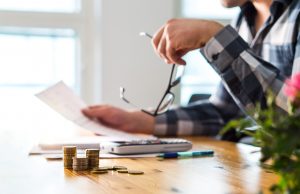The slew of job layoffs that resulted from the COVID-19 pandemic has left millions struggling to make financial ends meet. The devastating economic impact on families continues to be a major source of worry. Bankruptcy may be a last resort, but debtors can prevent bankruptcy amidst the pandemic.
Financial devastation hits more marks than one. Individuals are concerned not only about personal finances, but about the economy, their jobs and their credit. Most Americans still have their jobs, but the COVID-19 outbreak has impacted their income in many ways.
Financial Effects of COVID-19
Salaries have been reduced for some, while others have lost their benefits. The most significant effect has been in the decreased number of hours for a large number of employees. With incomes slashed, households are feeling the brunt of the current health crisis.
Less income means individuals have less to spend on essentials, like food, medicine and housing. Many people also are worried about paying down debt. The types of debts people are concerned about paying down include personal loans and credit card.
Fortunately, the financial support from local, state and federal governments during the COVID-19 crisis in combination with help from creditors eases many Americans’ worries about being able to pay down their accumulating debt. Unemployment benefits, too, provide a safety net.
Here’s how to avoid bankruptcy during COVID-19:
1. Assess Finances
One of the first steps Americans should take to prevent bankruptcy is to ensure that all accounts remain in good standing now and in the immediate future. Anxiety is hardly a cause for initiating the bankruptcy process. Rather, ensure financial security to meet all debt obligations.
Keeping accounts in good standing starts with listing one’s monthly net income. Include money from unemployment insurance, current salaries and any other forms of income. Net income, which is the amount tallied after taxes and deductions, should also be counted.
Once a monthly net income is calculated, subtract all expenses. Monthly bills may include those for housing, food and utilities. The amount left over after subtracting expenses from the monthly net income is what may be applied toward repaying debt.
Similar to tallying the net income and expenses, list all debt obligations. Debts often include credit cards and loans. When listing each debt, also make note of the minimum payment required of each to remain in good standing. Sum up the minimum monthly debt repayments.
Bankruptcy will not come knocking if, after subtracting the monthly expenses from the monthly income, the debtor has enough to maintain minimum debt repayments. However, if funds are scarce and not enough to cover minimum monthly debt repayments, consider alternative options.
2. Reduce Expenses
Reducing one’s expenses is the most surefire way to improve one’s financial status. Cutting back on dining out, at least temporarily, for instance, will contribute to savings. When reducing a grocery bill further is impractical, consider cutting costs in other areas.
During the COVID-19 outbreak, buying a seat in a crowded stadium will be impossible. Instead, use the apportioned funds toward debt repayment. In addition to sports and concerts, eliminate other entertainment, at least while the coronavirus outbreak keeps the economy at a standstill.
3. Earn More Income
Another way to work toward financial health is to earn additional income. A supplemental part-time job can add more to one’s income. Alternatively, participate in the gig economy to bring in more money. When working more is not doable, sell personal possessions online.
4. Utilize Government Assistance
Government-issued stimulus checks are helpful to many, but primarily for the short-term. Other forms of government assistance that have sprung up during the pandemic include temporary deferments of student loan payments. Private student loan holders are urged to look into similar relief.
Citywide utility shutoffs are prohibited during the pandemic. However, the unpaid balance will add up, becoming a sizable amount in coming months. Although these bills can be discharged in bankruptcy, a shrewd action to take would be to repay these debts.
The federal government has swiftly responded to the financial crisis caused by the COVID-19 pandemic with the Coronavirus Aid, Relief and Economic Security (CARES) Act. Homeowners who have federally backed mortgages are given expanded protections under the provisions of the new CARES law.
The CARES Act also resulted in the Paycheck Protection Program. Small business owners may be eligible for loans backed by the Small Business Administration. Cash-flow assistance to cover payroll expenses and debt repayments are just two benefits of these special loans.
5. Negotiate Obligations
Negotiations with lenders is a practical and necessary step to handle looming debts during the coronavirus outbreak. The CARES Act stipulates that debtors’ consumer credit scores will not plummet for a brief duration when the debtor pays less than the normal payment.
A debt management plan also helps to protect against bankruptcy. Working with credit counselors helps debtors lower their interest or decrease the payoff amount. Be aware that paying a lower amount than what is owed could possibly damage the debtor’s credit.
Developing a sound financial strategy during these hectic times caused by the COVID-19 outbreak is necessary to avoid filing for bankruptcy. Take care to examine payment requirements. Payment dates may be shifted—but be aware that these debts are not waived and must eventually be repaid.
Work with a Bankruptcy Attorney
If you are considering filing bankruptcy, despite best efforts during the COVID-19 pandemic to prevent doing so, turn to the area’s most trusted law firm, Berry K. Tucker & Associates, Ltd. Our experienced bankruptcy lawyers will explain your best legal options, whether it is Chapter 7 or Chapter 13 Bankruptcy.
Chapter 7 Bankruptcy is practical for those with insufficient income, a scenario common in today’s coronavirus climate. Our skilled bankruptcy attorneys will work to ensure your unsecured debts, including credit card and medical, as well as home and foreclosure judgments, are forgiven.
Bankruptcy filings are complex and different for each individual. The knowledgeable bankruptcy attorneys at Berry K. Tucker & Associates, Ltd. evaluate each unique situation to help clients make the right financial decisions. Residents of the Southwest Chicago area are urged to consult Berry K. Tucker & Associates, Ltd. for reliable legal advice.
Free Consultation
Give us a call at 708-425-9530 or fill out a contact form for a free consultation regarding a possible bankruptcy case.
Tags: bankruptcy attorneys, bankruptcy lawyers, covid-19, how to avoid bankruptcy during covid-19, law firm




